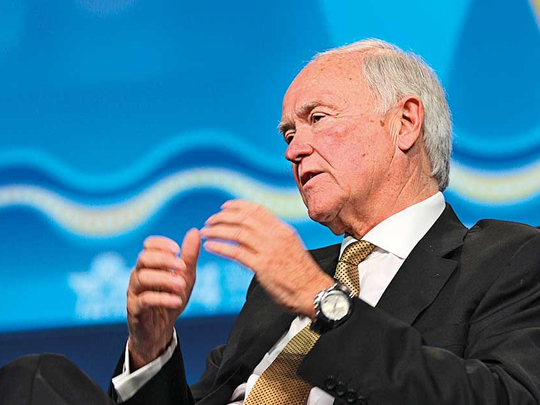
Sydney: Rising fuel prices together with a strengthening US dollar will squeeze Emirates Airline’s profitability this year, with the head of the carrier describing the two forces as a “double whammy.”
Emirates president Tim Clark, said he was concerned about the impact of a stronger currency, adding that while Emirates is “quite good” at dealing with these challenges, the task is “not easy.”
“We have a double whammy at the moment; strengthening dollar, strengthening fuel prices. Naturally, that is going to take a mathematical hit on the yields that we get out of our markets that are non-dollar denominated at the same time that we have fuel prices rising,” he told reporters at the International Air Transport Association’s 74th annual general meeting in Sydney on Monday.
“Volatility rules. Who would have thought the dollar would be up where it is today at the time when fuel is up. Normally, they are in inverse relationship; as the dollar strengthens, fuel comes off, but this time, it’s twice (both), so it’s a new one.”
Emirates has traditionally seen strong effects on its revenues from currency fluctuations as that impacts travel demand. In 2017, with a dollar shedding over 10 per cent of its value, the airline recorded a Dh661 million gain just on the back of that.
A year earlier, with a strengthening dollar, Emirates reported a Dh2.1 billion hit to revenues “due to unfavourable currency exchange.”
Premium economy class
Clark also discussed Emirates’ plans to launch a premium economy class on its aircraft from 2020.
“The new order [of A380s] will have premium economy in them. We’ll also retrofit some of the old fleet as well, and the new 777s will have premium economy,” he said, adding that Emirates already has a design for the new cabin class.
“All we’re going to do is recognise that premium economy is something that’s here to stay. It’s successful in other carriers. We’ve noticed what you call a leakage out of our mainstream passenger demand into carriers that have it.”
Clark confirmed that Emirates will not be axing or cutting down on the number of seats in First or Business classes in favour of the new cabin class. When introduced, in a four-class configuration, premium economy will account for 6-8 per cent of the total seat inventory.
He said that even at 6-8 per cent of seats, this would be lucrative enough for Emirates.
“It’s enough to recognise the demand as we put our feet in the water. If that demand increases and it doesn’t compromise our ability to maximise the profitability of the rotation, then we may introduce more,” he said.
When introduced, Emirates wants to make sure premium economy class seats are priced at a point that doesn’t draw traffic away from Business class, but takes passengers who are already paying higher fares in economy to get more flexibility.










